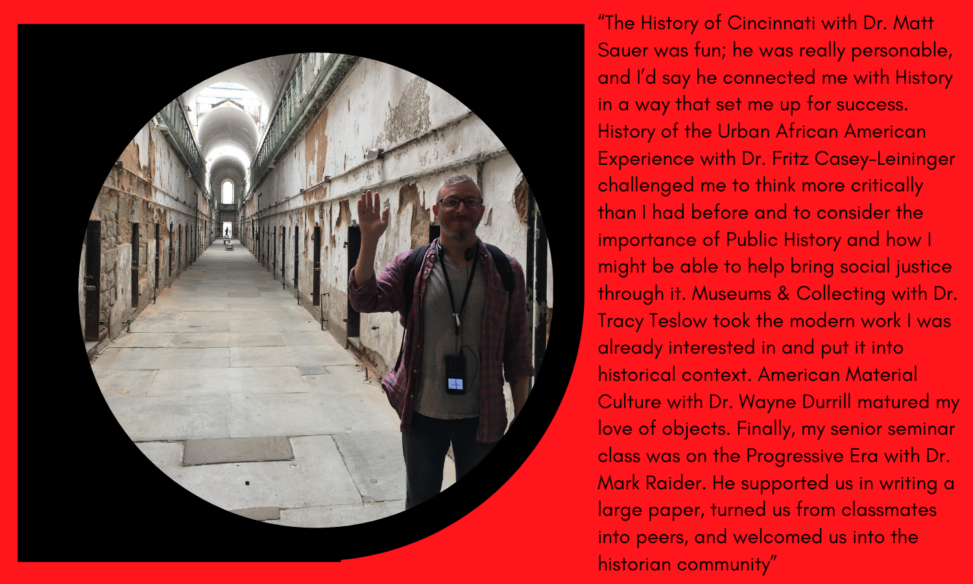I’m a Cincinnati native and a graduate of UC’s history program, and I think I can say I have the job now that I hoped for back then. I’m a librarian at the UC Archives & Rare Books Library. I answer reference questions, connect people with rare and unique material, and work to ensure the books and information they contain are not destroyed or lost.
I have many favorite things about my job. Interacting with old, sometimes centuries-old materials daily is such a privilege. Many of the books and manuscripts, as objects, have a history just as important as the information they contain. As a reference librarian, I have no shortage of opportunities to interact with these objects and learn something new. As an archivist, I also act as a public historian by preserving historical records of UC, the city of Cincinnati, and the people who made them.
What are you up to these days?
Outside of work, I’m a big D&D and board game nerd. I paint game miniatures and go to several public game nights. I try to keep up with local music, although I usually put more effort into seeing old punk bands while they’re still around.
What brought you to history at UC?
I have a lifelong love for historical objects and places, the stories they tell, and an interest in preserving them. While it’s true that UC conveniently offered me the ability to study in my hometown, as I continued my education here, I became more excited about the program and the ability to connect what I was learning to Cincinnati.
What did you focus on as a history student at UC?
I focused on opportunities to support the field of work I had chosen (libraries and archives) and ways to increase my knowledge of Cincinnati’s history. Some classes conveniently fit the bill, such as Museums & Collecting or History of Cincinnati, while others, like History of the Urban African American Experience, had a broader topic but included Cincinnati’s history.
Did you have any favorite history courses? Which ones and why?
I certainly did! In no particular order, History of Cincinnati with Dr. Matt Sauer was fun; he was really personable, and I’d say he connected me with History in a way that set me up for success. History of the Urban African American Experience with Dr. Fritz Casey-Leininger challenged me to think more critically than I had before and to consider the importance of Public History and how I might be able to help bring social justice through it. Museums & Collecting with Dr. Tracy Teslow took the modern work I was already interested in and put it into historical context. American Material Culture with Dr. Wayne Durrill matured my love of objects. I went from thinking, “Something is cool because it’s old,” to relating objects to the people who used them and wanting to preserve them for the stories they tell. Finally, my senior capstone seminar class was on the Progressive Era with Dr. Mark Raider. He supported us in writing a large paper, turned us from classmates into peers, and welcomed us into the historian community.
What did you focus on in your capstone and why?
My senior seminar class was on the Progressive Era. I used my capstone to marry my two passions, Cincinnati and libraries, by discussing the history of the children’s reading room at the Cincinnati Public Library.
What skills did you pick up from studying history that have served you well beyond your courses?
Above all else, what I’ve found invaluable was learning to look at how historical and current events affect different people differently and value different interpretations of events. It’s made me a more understanding and compassionate person for certain, making me a better reference librarian.
Learning to perform research, especially finding original source material, has also been enormously beneficial. I do this daily to directly answer a reference question or guide people in doing this themselves.
Have any advice for current students?
Practice CONSTRUCTIVE criticism of yourself and learn to recognize what, if anything, isn’t working. We don’t all learn and retain information the same way. Some people can listen to a lecture for an hour and remember everything, some people need to take notes; some people try to take notes but don’t know what to actually take note of and end up with pages of notes with no idea what they mean (me); and some people are listening to the lecture, thinking about what they learned last week, and/or in a different class, and/or an assignment for another class, and/or about how they let their mother down for mother’s day (also me). I wish I had spent less time doing poorly and beating myself up about it and more time taking advantage of the support and services available to me. Talk to your professors if you’re not getting something, ask them about accommodations for your learning style.
